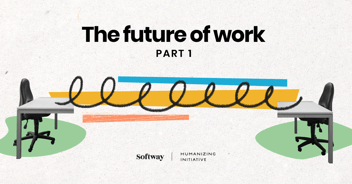
As 2020 continues to run its course, and likely careen into 2021, there is solace in one unpleasant, but honest reality: Things are not “getting back to normal.”
Beyond being an incredibly hackneyed platitude, “getting back to normal” has become something of an anchor to the past we cling to. Even the word “normal” itself is strongly and perhaps hopelessly nostalgic—it’s a destination that no longer exists.
To aspire for normal is to hyperfocus on, “What things were” and not, “What things can be.” And psychologists will largely agree, becoming preoccupied with the past can halt and arrest any progress forward.
Now, I’m not saying wanting to return to normal is something to be ashamed of, or that it’s pointless and you should drop out of work and become a nihilist. Quite the opposite, really.
Wanting to return to normal is an acknowledgement that change is needed. It’s a solid first step, but it’s only one step—there’s no second or third steps to follow because like I said, “normal” is an anchor to the past.
If you want something better than normal, something different, something realistic—if you are tired of focusing on, “What things were” and are ready for, “What things can be,” read on to start your journey.
Forgetting normal
Acknowledge where you are, no gaslighting
Show of hands: Who’s felt uncomfortable, devastated, overwhelmed, unsure, or just plain shook in 2020? Wow, everybody raised a hand—not surprising.
So, why do we pretend like everything is okay? Why do we avoid vulnerability? And why do we put up opaque borders and carry on “business as usual”—or rather, “business as normal.”
By consensus (the show of the millions of hands raised above), things aren’t alrighty—so why not say so? It’s not only healthy, but helpful to say so.
As teams and individuals we need to honestly share where we are: emotionally, physically, and spiritually. We cannot move forward, and we cannot move somewhere new or better unless we first understand where we are in the present—the now.
It’s incredibly scary to be vulnerable—to openly acknowledge where you are. So, when others choose to share, don’t minimize or dismiss their grievances—that’s gaslighting. And you should know just how hard it is to be in that exposed position.
Reimagination: it won’t be what it was
Normal is dead—normal is what it was. So, we need to discover something different, invent something new, and create something never before imagined. We need to reimagine what it can be.
Once your team understands where they are, collectively and individually, you can start to reimagine and construct the future you want, together.
Reimagination is more than identifying a rosy or ideal future, “Hey, wouldn’t it be nice if…” Reimagination is about action, outcome, and understanding that we are incontrol—that our futures can only be written by us.
Pobody’s nerfect, nobody’s perfect
Stuff happens. Things get dropped, deliveries botched, and meetings get heated. You won’t always be able to predict or prevent it from happening and that’s okay. You need to be okay with it, because when stuff happens there’s feedback.
Feedback is how we overcome adversity, learn from mistakes—and help turn down the temperature when things get a little too spicy. You need to be brave and courteous giving feedback to others, and you need to crave feedback for yourself.
Feedback is a gift, it means you care—teams that let feedback flow freely differ in that “good enough” is not good enough. They are driven by constantly asking and pressing, “How can we do it better?”
Want to learn more about the power of feedback? Hop over to the piece I wrote on why it’s essential to crave feedback.
Thanks & praise
Saying, “Good-bye Normal,” and leaving it in the rearview mirror requires being vulnerable and open to reflection, reimagination—and a whole lot of compassion and care.
Simply put: it ain’t easy—so give praise and say thank you, early and often.
When a team member takes on a new role, whether successful or not, commend their effort. When someone is vulnerable to something they’re struggling with, praise their bravery. And when people are real and honest with one another—when they provide feedback and deeply care for each other’s growth, acknowledge and celebrate that level of benevolence.
Giving thanks and praise isn’t only important because it makes people feel good or appreciated—it helps people identify what is working and not feel discouraged by what isn’t working.
But, while distributing thanks and praise, don’t forget to give yourself plenty of thanks and praise, too. You’ve earned it.
Enjoy the little things
The big things are momentous, celebrate them—but it’s the little things that keep momentum going.
The little things we took for granted pre-COVID are not entirely gone—they’re just a little harder to find. And making the effort to find and enjoy them is even more important and substantial in these precarious times.
Missing the community breakroom? Pick a day every week to have virtual lunch or coffee together. Longing for the friendly banter and silliness between meetings? Keep it going in whatever chat platform your company uses, plus: memes, GIFs, and links to Youtube only elevate the witty repartee.
And are the days merging into one long, continuous Tuesday? Do something nice for yourself, make the day special—get yourself a cupcake, have a solo picnic in the park, go buy yourself a new plant for your home office.
Find time every day to enjoy the little things. They matter.
We’ve heard it from friends, family, politicians, and colleagues—you might have even found yourself saying it too, “I cannot wait till we get back to normal.” But, why? Why normal, and how can you get back to something that is gone and passed?
You can’t. Normal is dead.
However, you can get to a place that feels normal(ish)—something that is different, new, and better. It’s not easy, you cannot do it alone—but it is immensely meaningful in not only bolstering job satisfaction, but influencing higher-performing, resilient teams.




